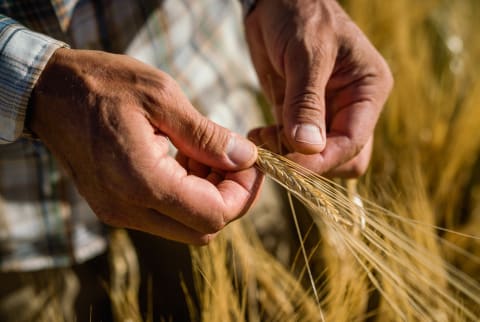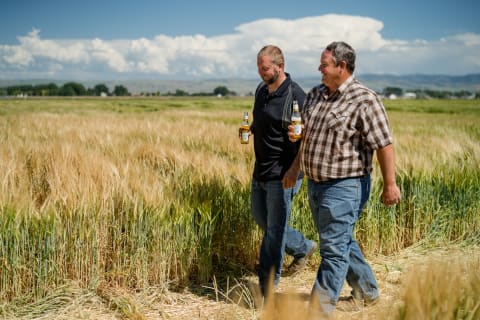Advertisement
What Percentage Of American Farms Do You Think Are Organic? It’s Less Than That

We're living in a time when the world's top restaurants are iterations on farm to table, tech giants buy up health food supermarket chains, and a plant-based burger soars beyond a $10 billion market valuation. So it's not hard to imagine that organic food sales in the U.S. continually skyrocket year after year, having broken through the $50 billion mark in 2018.
Considering where we were just a decade ago, all this seems like a success story in the making. But there's one major part of this story that's not adding up: We're demanding more organically produced goods than ever, but still less than 1% of all American farmland is certified organic.
What's going on?
There are many factors contributing to why U.S. organic farms haven't exploded on the map as demand heats up. But one of the biggest reasons farmers have been slow to switch over is the three-year transition period that farms must go through before they can be certified as organic by the USDA.
Three full years of keeping your land free of most chemicals is not a cheap endeavor for many farmers. On top of the labor shortages that U.S. farms already face, farmers transitioning to organic have to put in extra work and their own money to change over their equipment, regenerate their soil's health, and prevent pests, disease, and weeds through practices like crop rotation.
We’re demanding more organically produced goods than ever, but still less than 1% of all American farmland is certified organic.
They're essentially farming organically for three years—without getting paid the premium prices that come with certified organic crops. Most farmers simply can't afford the arduous undertaking.
Not to mention that there's no manual for any of this. If anything goes wrong, farmers have little in the way of resources for support. In a recent study by Oregon State University and Oregon Tilth, 1,800 transitioning farmers cited mentoring from experienced organic farmers and one-on-one technical assistance as crucial to their success—but both can be hard to come by. The three-year road to converting farmland to organic is so expensive, complicated, and risky, it's no wonder most farmers choose to stay conventional.

The good news? Big changes are happening.
The thing is, farmers want to make the switch. "We believe in organic practices because it's the right thing to do for the environment," said one farmer quoted in the OSU study. "However, to get more farmers involved, there need to be more economic incentives—price premiums or subsidies."
To alleviate the financial stress and pressure on farmers and their families transitioning to organic agriculture, brands like Michelob ULTRA are stepping in. They're the makers of Pure Gold, the first national beer to be USDA-certified organic (and our beer of choice for serving up with grilled veg and burgers at this year's mbg revitalize). So it makes sense that they're behind the recently launched Contract for Change initiative, giving farmers who want to go organic the support they've been lacking up until now.
With Contract for Change, Michelob ULTRA offers farmers and their families a measure of assurance against some of the risks with a partnership that pays it forward. The deal? Farmers commit to moving to organic, and Michelob ULTRA commits to buying their grains at a premium cost during and after the transition process—rain or shine.
The initiative is a natural move under Anheuser-Busch's 2025 U.S. Sustainability Goals, one of which focuses on financially empowering 100% of the company's barley, rice, and hops farmers. As Pure Gold continues to shine in the organic beer space, it's cool to see big names like Michelob ULTRA become a major player in making organic ingredients more accessible by supporting farmers across the country.
The peace of mind that comes from partnering with a company with a sizable demand has already helped a number of farmers feel comfortable going organic. Other strategies to move the needle are in the works, too, including several "certified transitional" programs—there's even one such label in stores to help consumers vote for a more organic future in the U.S. with their dollar. But thanks to initiatives like Contract for Change, that future may be here sooner than we think.












